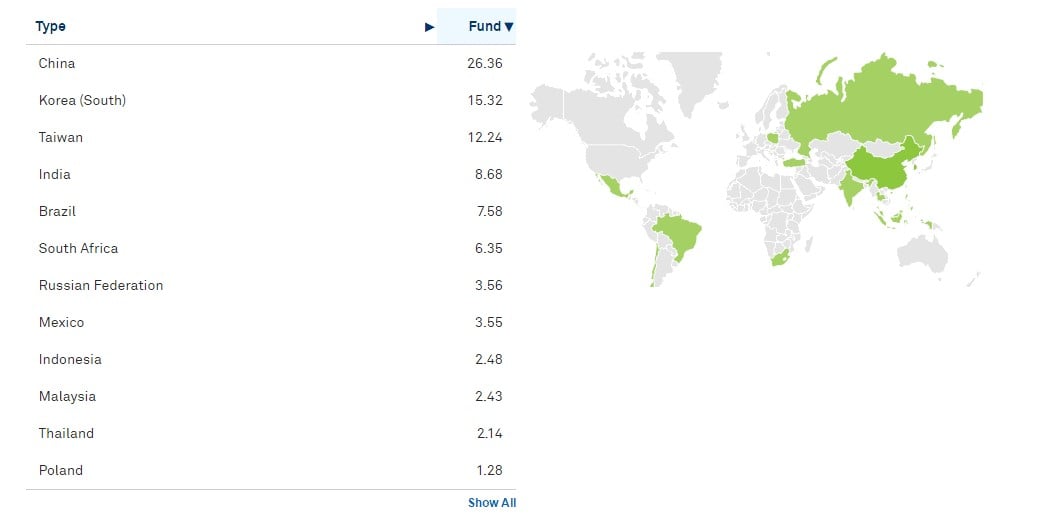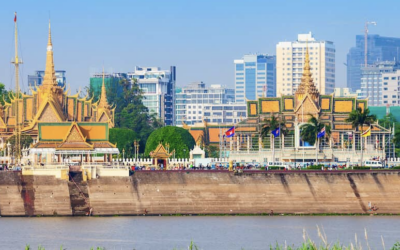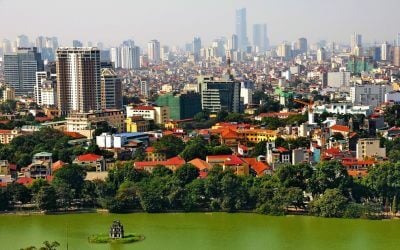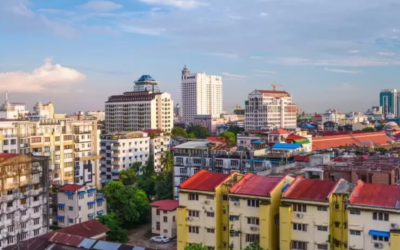Countless times, clients have told us they’re “already investing in emerging markets!” because they bought into a mass market ETF or mutual fund from Vanguard or iShares.
Don’t get us wrong: we aren’t saying these emerging market ETFs won’t go up in value over time or that you shouldn’t buy them.
But it’s worth addressing a common error that many people make when investing overseas.
See, most investors purchase shares in an emerging markets ETF, or a similar mutual fund, for two different reasons.
The first reason why people invest in emerging markets is simply to diversify their portfolio. Not having to rely on the performance of a single market or currency can limit your overall downside.
Meanwhile, the second reason is to achieve higher returns. Emerging markets are called such for a reason – they’re normally growing faster compared with developed economies and are, well, emerging.
Here’s the issue though: a typical emerging markets ETF or fund that your brokerage tries selling you won’t accomplish either of those things.
Quite frankly, you aren’t investing in emerging markets correctly if you’re doing it through an ETF or mutual fund.
Let’s explore the risks of emerging market ETFs, and uncover why these funds don’t invest emerging economies the right way.
You Aren’t Even Investing in Emerging Markets
A large percentage of stocks owned by emerging market ETFs and funds aren’t even located in emerging markets.
You read that right: emerging markets funds don’t even invest in their namesake. At least, not nearly as much as they should.
Simply look below at the holdings of the iShares MSCI Emerging Markets ETF. This is the largest Emerging Market ETF on the planet with over US$30 billion dollars under management.
However, two out of the top three nations they invest in are South Korea and Taiwan, together which account for more than 25% of the fund’s total assets.
South Korea and Taiwan are developed nations by any possible metric. Each of them boasts a GDP per capita exceeding that of New Zealand, Israel, or Italy’s.

Rather an “Emerging Markets ETF”, this fund should probably be called a “China and Developed Asia ETF”. Half its holdings are from China, South Korea, and Taiwan!
Other funds, such as Vanguard’s FTSE Emerging Markets ETF, don’t fare much better. They are big fans of Taiwan for some reason.
Yet more bizarre is that this fund has exposure to the United Arab Emirates and Qatar – two of the richest nations on the whole planet.
Emerging Markets Won’t Meet Your Goal in the First Place
Generally speaking, it’s a good idea to spread your portfolio across several currencies and jurisdictions.
Merely ask anyone holding British Pounds who saw their net worth, in terms of most other top global currencies, decline by around 20% because of Brexit’s impact.
While emerging market ETFs and mutual funds can indeed help you invest in other currencies, they fall short when it comes to avoiding financial crises altogether.
In fact, most emerging economies fared even worse than the United States and Europe during the 2008 Global Recession.
Why is that? Although emerging market economies are fundamentally different from those in the developed world, they’re still dependent on wealthier nations for growth.
Our planet is now interconnected. 7-Eleven and Starbucks can be found in almost every corner of the globe. Therefore, emerging economies rely on continued investment from multinational firms to fuel their own growth.
But when the US, EU, or China enters a recession, investment from large multinationals stops flowing in.
The result is that emerging markets also enter a decline – sometimes an even worse one compared with developed economies. Indeed, it’s a major risk of investing in emerging markets.
Frontier Markets Might Be Your Answer
If you truly want to grow and preserve your wealth, you may want to invest in frontier markets. Such rapidly growing countries have a history of skipping global crises altogether.
Cambodia, for example, only had a single year of negative GDP growth in the past three decades. Other frontier markets like Mongolia and Kenya enjoy a similar performance.
These places don’t need to worry about McDonald’s cutting back on expansion since they don’t even have McDonald’s in the first place.
When these large multinationals do inevitably arrive, the extra investment will surely boost their economic growth even further though.
In short: an emerging market ETF won’t help you avoid recession. Yet frontier markets can.
FAQs: Emerging Market ETFs
Why Don’t Emerging Markets ETFs Truly Invest in Emerging Markets?
Many so-called "emerging markets" ETFs allocate a significant portion of their funds to countries that are actually developed economies.
For example, the iShares MSCI Emerging Markets ETF, one of the largest in the world, invests heavily in South Korea and Taiwan, both of which have GDP per capita levels higher than some European nations.
Additionally, some funds even include the United Arab Emirates and Qatar, two of the richest countries globally. This means that investors looking for true emerging market exposure may not be getting what they expect.
Do Emerging Markets ETFs Help Diversify a Portfolio?
Not as much as investors might think. While these ETFs do provide exposure to different currencies, they do not necessarily protect against global financial crises. Many emerging markets remain highly dependent on investment from developed economies.
When a major economy like the U.S., the EU, or China enters a recession, capital inflows into emerging markets slow down, often causing an even greater downturn in these economies. This interconnectedness means that emerging markets ETFs may not offer the diversification benefits that investors seek.
What's a Better Alternative to Emerging Market Mutual Funds and ETFs?
For investors looking for higher growth and better diversification, frontier markets may be a better option. Countries like Cambodia, Mongolia, and Kenya have historically been less affected by global recessions.
Since these economies are still in the early stages of development, they are less reliant on multinational corporations and global capital flows, making them more resilient during economic downturns.
Should I Completely Avoid Emerging Markets ETFs?
Not necessarily. Emerging markets ETFs can still provide some exposure to fast-growing economies, and they may increase in value over time. However, investors should be aware that these funds do not always invest in true emerging markets and may not offer the diversification or growth potential they expect.
Those seeking higher returns and better protection against global downturns should consider direct investments in frontier markets or other asset classes that are less correlated with the global economy.







